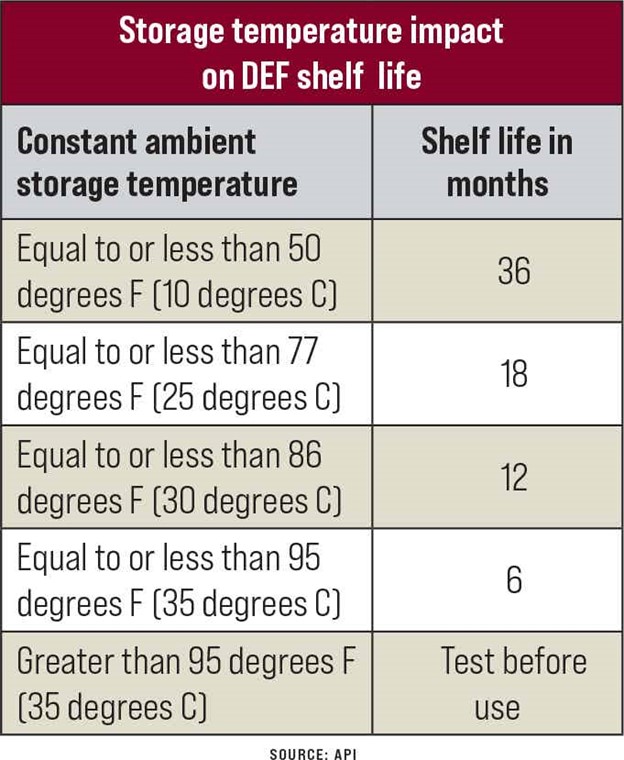Keep farm diesel fleet going strong with proper DEF storage
Keep farm diesel fleet going strong with proper DEF storage
Originally published on Farm Progress.
As modern farm diesel equipment fleets grow, proper storage of diesel exhaust fluid — used in diesel engines to reduce harmful emissions — has become just as crucial as maintaining fuel supplies.
Contaminated DEF tanks can lead to thousands in repair costs and days lost during critical farming windows.
While it might seem cost-effective to buy DEF in bulk and store it on the farm, it is important that the shelf life of the DEF is kept in mind, along with the right conditions to maintain its longevity.
“Some of the biggest mistakes that we see with DEF has a lot to do with the storage, the temperature and how long people keep it. People tend to think that it has a longer shelf life than it does,” says Beth Wilson, a manager of the DEF department at the American Petroleum Institute.
Proper storage of DEF is just as critical as where to source it from. One way that farmers can ensure that the fluid is certified and compliant is to purchase DEF that is certified by API.
Best practices
DEF is made up of two ingredients: urea and water. But the quality of each of these ingredients is of utmost importance because contamination can take a toll on your equipment.
“DEF must be made of two ingredients at the correct ratio: technically pure urea and purified water. Changing either of those ingredients will alter the product,” Wilson says. “It can cause blockage and cause your machinery to shut down and sometimes take out an entire fleet.”
If you are a producer with a large fleet and are storing DEF on the farm, it is important to follow these tips to make sure that you are putting a high-quality and uncontaminated product into your equipment:
Maintain ideal storage conditions. According to API, high temperatures can reduce the shelf life of the product. Monitor the temperature, even in the cold months, because DEF can expand up to 7% when it is frozen. See the table to check that you are storing it at the correct temperature, and how this affects shelf life.

Rotate stock regularly. Producers need to rotate stock so they use the oldest DEF on the farm first.
Ensure proper clean-out. Store DEF in bulk tanks. To prevent contamination between emptying and filling the tank, it is suggested by API to use distilled or deionized water. This also includes rinsing out anything that might encounter the new DEF.
“We always tell people to try to not buy it in bulk if you do not need a lot all at one time,” Wilson explains. “If you are not filling up an entire fleet of trucks or farm equipment, there are just too many variables when storing it for a long time.”
What to avoid
While it is crucial to keep good practices at the top of mind when storing DEF, there are also some important storage “don’ts” that producers should avoid:
Avoid direct sunlight and high temperatures. This can accelerate degradation of the DEF product.
Don’t add aftermarket additives to DEF. It may harm the quality of the product and could void any warranties that might protect your equipment.
Avoid using tap water to clean equipment. When cleaning out the DEF tanks, put your garden hose away because it can ultimately lead to contamination, not only from the tap water, but also from what might be in the hose.
Once farmers take these tips into consideration when storing and handling DEF on the farm, it is important to double-check that your DEF has been certified by API.
“Look for the API marks because that protects you,” Wilson says. “API-certified DEF products have been certified to meet the ISO and OEM requirements and are tested in the aftermarket to assure compliance. This is the biggest protection for the end users because SCR system repairs can get expensive.”
Wilson recommends taking that extra step to ensure that your supplier is API certified. It only requires a quick look at the website here or a phone call to your supplier.
So, the next time you put in a bulk order for DEF, keep these tips in mind to ensure that your high-quality product avoids contamination, and overall, does not damage your equipment.





